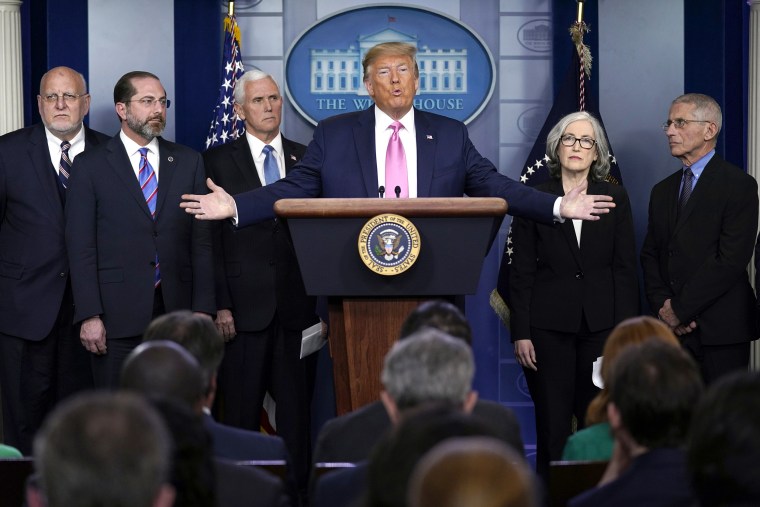In the early stages of the coronavirus outbreak, experts pointed to a mortality rate of 2.3%. This week, however, the World Health Organization pointed to an even more alarming figure. During a Tuesday press briefing, WHO Director-General Tedros Adhanom Ghebreyesus said, "Globally, about 3.4% of reported COVID-19 cases have died."
The difference may appear mathematically modest, but given the number of cases, and the speed with which the crisis is spreading, that larger figure translates into a significantly larger number of fatalities.
And while this new assessment should be sobering for officials around the globe, at the White House, there's a problem: Donald Trump has decided not to believe the number.
During a Fox News interview last night, Sean Hannity referenced the 3.4% figure and asked for the president's reaction. Trump replied:
"Well, I think the 3.4% is really a false number. Now, this is just my hunch, and, but based on a lot of conversations with a lot of people that do this -- because a lot of people will have this, and it's very mild. They will get better very rapidly. They don't even see a doctor. They don't even call a doctor. You never hear about those people. So, you can't put them down in the category of the overall population in terms of this corona flu and, or virus."
As part of the same response, the president went on to say, "So, if we have thousands or hundreds of thousands of people that get better just by, you know, sitting around and even going to work -- some of them go to work, but they get better."
Trump added that he considers the data from the World Health Organization to be "very high." And what, pray tell, does the amateur president believe is the actual fatality rate?
"I think the number -- personally, I would say the number is way under 1%," the Republican declared, adding, "It's not that severe."
So to recap, in the midst of an intensifying public-health emergency, the sitting president of the United States told a national television audience not to believe the research from the World Health Organization's experts; the virus can be characterized as the "corona flu"; and some people go to work after contracting the virus, which Trump characterized as no big deal because "they get better."
In case this isn't already painfully obvious, no good can come of such reckless rhetoric from the chief executive of a global superpower. Sensible and responsible people should not believe what Trump said. By most measures, it would be dangerous to take his rhetoric seriously.
But just as unsettling is the familiarity of these circumstances: as the outbreak has unfolded, Trump has consistently contradicted experts and authorities. As of last night, he feels justified in doing so based on his "hunches."
The viral outbreak is already scary. The more the president talks about the subject, the scarier the situation becomes.
